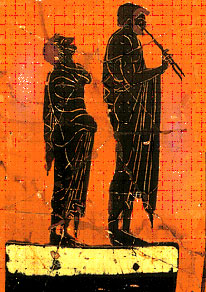courtesy of musicportal.gr
It's very difficult to generalize with Greek music. There were drinking songs, work songs, love songs, wedding songs, bridal chamber songs, funeral dirges, odes for heroic warriors, and hymns for the gods. There were wild choral songs interspersed with shouting to pay tribute to the playful Dionysus, and there were simple aulos tunes to serenade the relaxing symposiasts.
There are strangely beautiful and undoubtedly powerful choruses to enhance the emotional effects of drama and the theater, such as the Stasimon Chorus from Orestes (408 B.C.E.) here:
And there are mysterious hymns to the gods, designed to intensify the listeners' wonder and solemnity, like this Delphic Hymn to Apollo (138 BCE).
Not only are there so many genres and purposes to these musical endeavors, but there are likely thousands of songs of which we have no record. It's terribly difficult to make generalizations about a two-thousand-year-long timespan.. Look at how much our music has evolved in the last fifty years!
In my next post, I will explore the way Greek music has been portrayed in more recent media, and give my critique, based on the similarities and differences to actual Greek music, and how the time in which it was published may have influenced its compositional elements.
In case anyone was wondering, this one is my favorite. It's from Seikilos's Epitaph, written sometime between 200BCE and 100CE.
